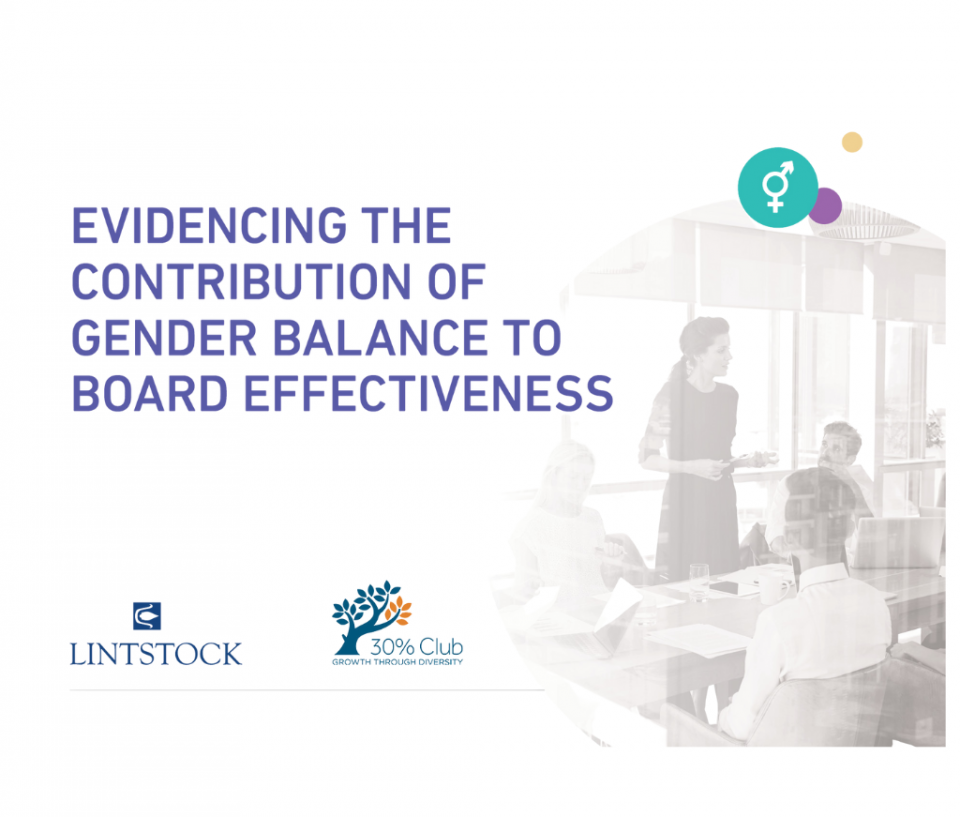What diversity delivers
The 30% Club, in partnership with board advisory specialists Lintstock, has today issued new qualitative analysis based on the engagement of male and female directors in 100 FTSE board reviews in a report titled Evidencing the Contribution of Gender Balance to Board Effectiveness.
The survey showcases the difference gender diversity makes to the running of corporate boards, with a significant finding that women are more likely than men to focus on emerging issues, notably company culture and employee development.
In addition, female directors were also more likely to offer criticism and recommendations for improvement on both their own performance and their business activities.
The past twenty years have irrevocably changed the way businesses think about board composition and the impact this has on decision-making, with a push for greater gender diversity at the forefront of this shift in perception.
Through examining the engagement of male and female directors in board reviews, this study illustrates how gender diversity contributes positively to board performance. The findings show that gender balance is no longer a question of fairness, but that of effectiveness.
Despite the increased focus on ethnic diversity, the analysis highlights there have yet to be any examples of boards truly grappling with diversity in its wider forms, with some mismatches occurring between diversity ambitions and boards’ actions.
By demonstrating the link between diversity and effective oversight, we hope that this study will renew the impetus of boards to go beyond the traditional candidate pool, to secure directors with a broader set of skills and backgrounds.
Other key findings…
- Female directors are more likely to identify the need for further board diversity in areas such as age, culture and social background
- Women are three times more likely to recommend greater ethnic diversity than their male colleagues
- Women engaged heavily on employee sentiment and culture and were over 50% more likely to serve as a designated non-executive director for engaging with the workforce – the most frequently adopted employee engagement mechanism
- Women were 50% more inclined to raise ESG performance as an area for improvement.
Hanneke Smits, global chair of the 30% Club and CEO of BNY Investment Management, said: “The findings further confirm that a more gender diverse group of board members will consider a greater variety of issues and ask a wider range of questions. Of particular importance in the report is the evidence that female board directors place a greater priority on hiring diverse teams and therefore increasing access to a broader pool of skills and experience.
“Against the backdrop of a challenging macro and geopolitical environment, it’s critical that companies harness the power of diverse talent at all levels of their organisation to succeed. At the 30% Club our focus is unwavering: diversity must remain on the board agenda and there is genuine progress to ensure current, and future, executive leadership teams better represent the society we live in.”
Neil Alderton, a partner at Lintstock, said: “Oversight of employees was becoming a headline concern for boards even before the upheaval of COVID-19 and findings from our study reveals that female board members are more than twice as likely as their male counterparts to identify the need to focus on people development and improving the diversity of the workforce.
“Better gender balance is not only a question of fairness – our findings show that it is also a matter of effectiveness. We see that diversity of gender contributes to diversity of thought around a number of board performance areas, broadening boards’ horizons and bolstering the support and challenge that directors are able to provide as a collective.”

